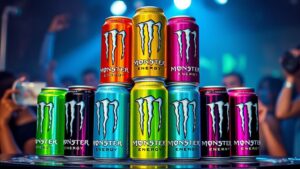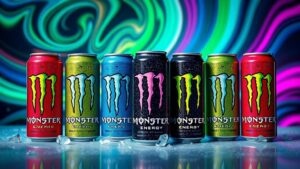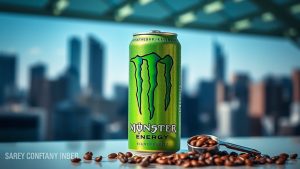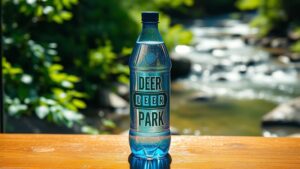How Much Caffeine Does Monster Energy Drinks Have?
Plunge into the caffeine content of Monster Energy drinks and uncover surprising details that could impact your energy choices.
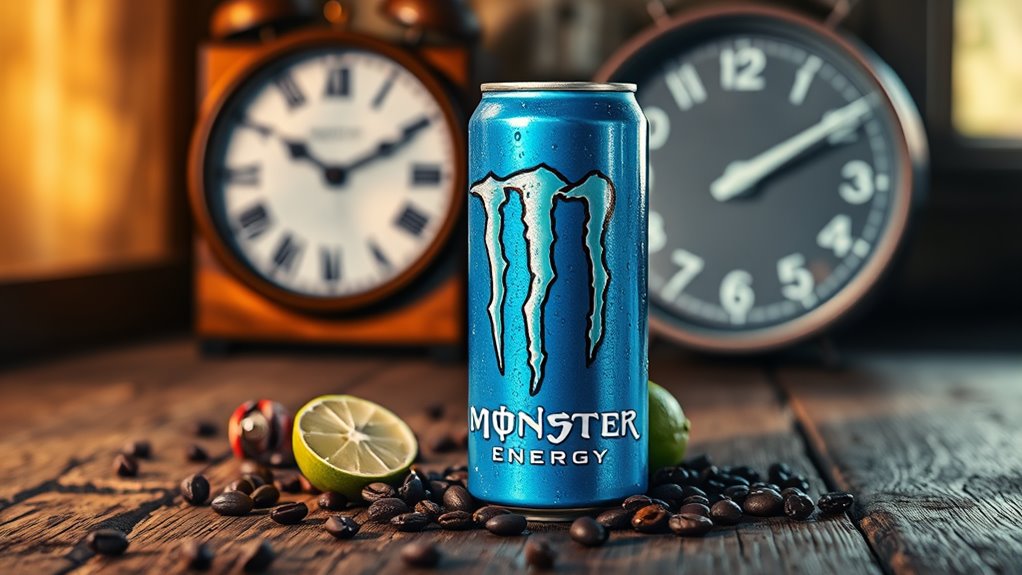
Monster Energy drinks have varying caffeine levels depending on the type. The original Monster provides 160 mg of caffeine in a 16 oz can, while Java Monster ramps it up to 300 mg. Other variants like Monster Zero Sugar and Energy Ultra contain between 140 mg and 160 mg per serving. Compared to other energy drinks, Monster sits in the middle range. There's more to discover about the effects and health considerations of these drinks.
When you reach for a Monster Energy drink, you're likely seeking an effective boost of energy, but it's important to know how much caffeine you're consuming. The original Monster Energy drink packs about 160 mg of caffeine in a 16 oz can. If you're opting for a flavor like Java Monster, be prepared for a caffeine kick of up to 300 mg per can. The caffeine content varies among the different Monster variants, but many maintain a consistent amount. For instance, Monster Zero Sugar also offers 160 mg of caffeine per serving, while the Monster Energy Ultra flavors have slightly less, ranging from 140 mg to 155 mg. Additionally, Monster energy drinks are known for their caffeine content being higher than Red Bull which contains around 80 mg in an 8.4 oz can.
In comparison to other energy drinks, Monster Energy generally has more caffeine than Red Bull, which contains around 80 mg in an 8.4 oz can. If you're thinking about Celsius energy drinks, you'll find over 200 mg of caffeine in a 12 oz can. Reign energy drinks can have between 200 mg and 300 mg of caffeine, and Bang Energy even reaches up to 300 mg per 16 oz can, surpassing Monster. On the other hand, Rockstar energy drinks have caffeine levels ranging from 160 mg to 240 mg per can, putting Monster in the middle of the pack.
When you look at coffee, a typical 8 oz cup contains about 100 mg of caffeine, while a shot of espresso has approximately 60-65 mg. If you were to drink enough brewed coffee to equal the caffeine in a Monster Energy drink, you'd likely consume slightly more caffeine. However, energy drinks often contain synthetically produced caffeine, which can result in a quicker energy spike due to the instant absorption in your system.
A typical 8 oz cup of coffee has about 100 mg of caffeine, while energy drinks can deliver faster spikes due to synthetic caffeine.
It's critical to be aware of the health effects and risks associated with high caffeine intake from energy drinks. Overconsuming caffeine can lead to issues like a fast heart rate and sleep disturbances. Due to the presence of other ingredients like taurine and guarana, energy drinks aren't recommended for daily consumption. Individual sensitivity to caffeine varies, so moderation is key. The FDA suggests a daily caffeine limit of 400 mg for most adults, and exceeding this can lead to withdrawal symptoms if you stop suddenly.
Interestingly, some Monster Energy flavors, such as Monster Unleaded, contain considerably less caffeine, usually under 20 mg. However, if you're looking for a strong boost, Java Monster and similar varieties offer the higher end of the spectrum at 300 mg. The range in caffeine content allows you to pick a drink that suits your energy needs, whether you're looking for a light pick-me-up or a more robust jolt.
Finally, it's important to keep safety and moderation in mind. Consuming energy drinks excessively can pose health risks, so it's wise to be aware of how many you're drinking. So, next time you reach for that Monster Energy drink, remember to think about not just the taste, but the caffeine content and how it fits into your daily limits.
Conclusion
To sum up, Monster Energy drinks pack a significant caffeine punch, with most varieties containing about 160 mg per 16 oz can. Think of it like a turbo boost for your day—just like a race car needs the right fuel to hit top speed, your body needs the right balance of caffeine to maximize energy. Just remember, moderation is key; too much can lead to a crash, much like a car running out of gas on the track.
